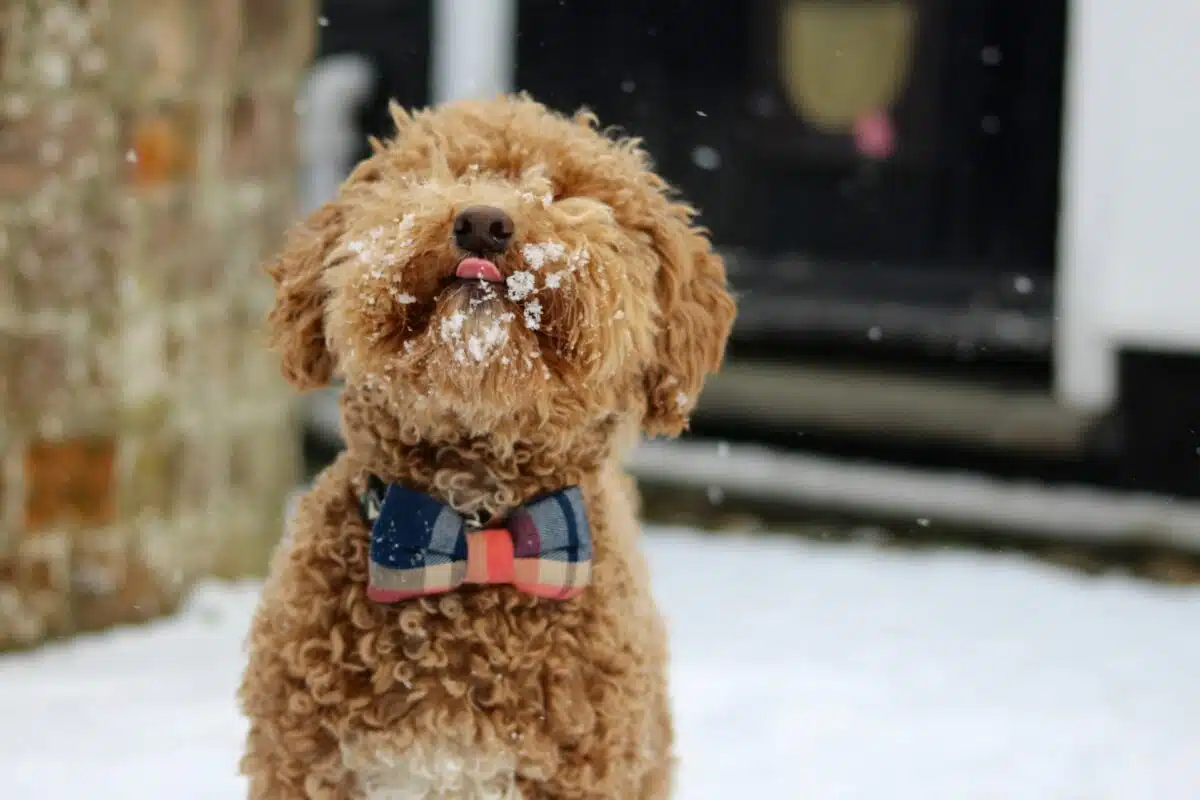In this post we’ve compiled everything you should know about the toy poodle; their appearance, traits, behavior, and much more!
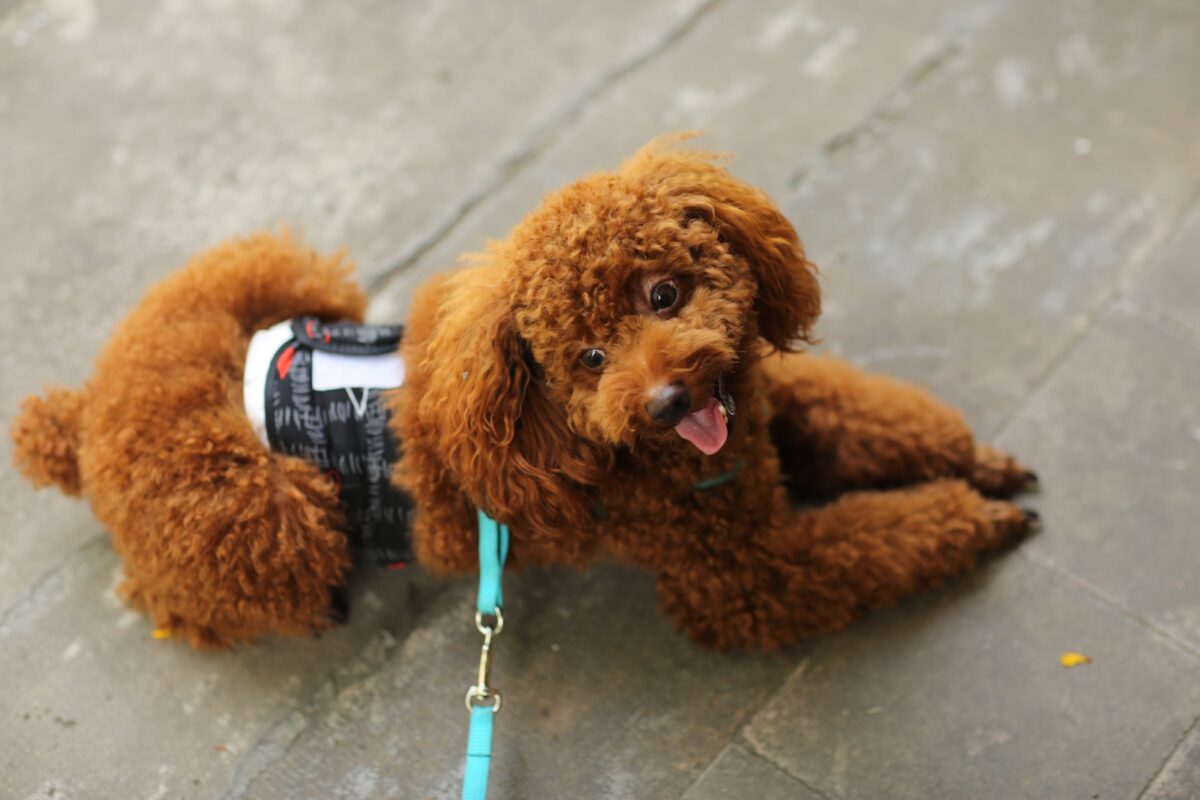
Almost every individual would agree with the fact that dogs are adorable creatures. Not only do they make perfect pets, but they also keep their owners’ homes lively and cheerful, thanks to their high energy levels and agility.
If you are looking for one such dog breed that will make you fall in love with their presence, the Toy Poodle could be the perfect canine companion for you.
Are you ready for some serious cuteness overload? Meet the Toy Poodle, the pint-sized pup with a big personality! With their fluffy, curly coats and big, soulful eyes, it’s impossible not to fall in love with these little balls of fluff.
However, don’t let their tiny bodies fool you since these dogs are a complete packet of energy and love to play. From their silly antics to their endless affection, Toy Poodles are sure to bring laughter and joy to any household.
So, if you’re looking for a best friend who will keep you on your toes and make you laugh, you should definitely look into adopting a Toy Poodle.
But, there is more to these adorable species than their charming appearance that you must know about before making them a member of your family. So, without waiting any longer, let’s examine their origin, characteristics, and lifestyle so that you can make an informed decision!
The Name and Origin of Toy Poodles
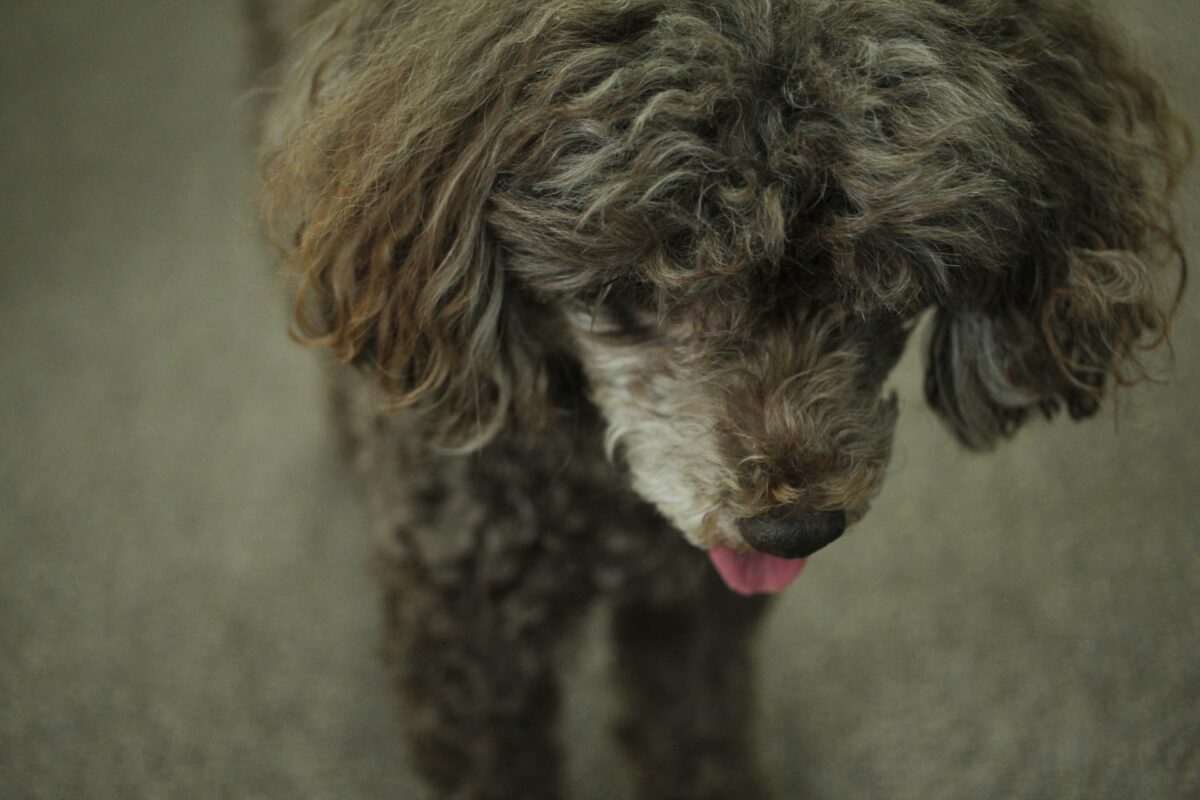
The Toy Poodle is a tinier version of the Standard Poodle, which is believed to have originated in Germany as a water-retrieving dog. Poodles were bred to have thick, curly coats to protect them from cold water and were used as hunting dogs. They were also trained to perform tricks and were popular as circus dogs.
The Toy Poodle was developed by breeding smaller Standard Poodles. They were first recognized as a different breed in England in the 18th century and became popular in France as well. The French nobility particularly favored them, and they frequently feature in paintings and sculptures from this time period.
The name “Toy Poodle” was coined by breeders to distinguish this smaller variety from the Standard Poodle. As you can guess, its name is derived from its size, which is considered a “toy” size compared to its larger ancestors. The word “poodle” originated from the German word “pudel,” meaning “to splash in the water.” This is a reference to their origin as water-retrieving dogs.
In the late 19th century, Toy Poodles were introduced to the United States for the first time. They quickly became popular companion dogs and were used in the circus and as performing dogs in vaudeville shows. Likewise, they were also used as therapy dogs in hospitals and nursing homes and as guide dogs for the blind.
Today, Toy Poodles are popular pets around the world due to their intelligence, trainability, and affectionate personalities.
Physical Appearance of Toy Poodles
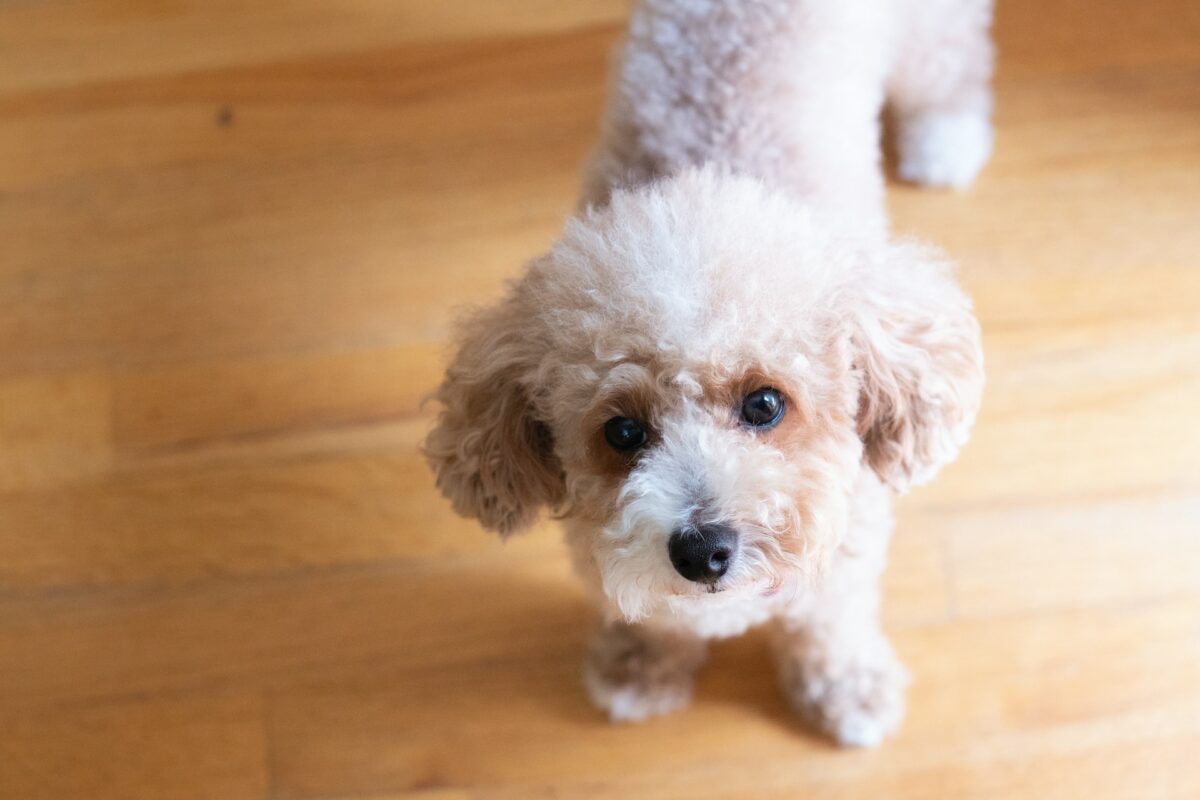
Toy Poodles are a truly elegant and charming dog breed, known for their fluffy, curly coats and compact, square-shaped bodies. They’re not just cute little fluff balls, though! These pups have a lot of personalities packed into their small frames.
One of the things that makes Toy Poodles so special is their thick and curly coat that comes in various gorgeous colors, including white, black, apricot, silver, and even blue-ish shades.
Moreover, their coat is hypoallergenic, which makes them a great choice for people with allergies. On top of that, unlike other breeds, Toy Poodles don’t shed much, so you won’t have to worry about cleaning up piles of fur all the time.
However, what really sets Toy Poodles apart is their expressive faces. They have dark, soulful eyes that seem to look right into your soul, coupled with their long, floppy ears that hang close to the head.
They have a long, straight muzzle with a black nose and a scissor bite. Moreover, their tail is usually docked and carried high, giving them a lively and alert appearance.
In terms of size, Toy Poodles are on the smaller side – just like the name indicates. They typically weigh between 4-6 pounds and stand around 10 inches tall at the shoulder.
Despite their minimal size, they have a lot of energy and love to play! They make great companions for people of all ages and are especially good with children.
Behavior and Temperament of Toy Poodles

These fluffy canines have a very distinct character! They are known for their lively and affectionate personalities and intelligence, making them a breeze to train. So, whether you’re a first-time dog owner or a seasoned pro, Toy Poodles are a great choice.
Besides, let’s not forget about their affectionate nature, as they are famous for their loyalty to their owners and crave human companionship. They make great lap dogs and enjoy cuddling with their owners. Toy Poodles are quite intuitive and will be sensitive to their owner’s moods. Like with a best friend, you won’t have to tell them that you’re feeling sad; they will just know.
Their outgoing and sociable nature are two of their famous traits. They enjoy being around people and other animals, which makes them great companion dogs. If raised with other pets and children, they will get along really well, and they tend to be quite tolerant of other animals.
Generally, they are quite independent dogs. They can be stubborn at times, so early and consistent training is important to prevent behavior issues from arising. They also tend to be quite vocal and might bark excessively if not properly trained and socialized.
In terms of attitude, Toy Poodles are generally a happy and outgoing breed. They are known for their playful and vibrant nature and enjoy being active and engaging in physical activity.
They make great companions for sporty people who enjoy being active and going for walks or runs. So, if you’re looking for a workout partner and energetic companion, a Toy Poodle could be the perfect fit.
This species also strongly desires to please its owners and is highly trainable. However, if not properly trained and socialized, they can develop behavioral issues such as barking excessively or being overly demanding. It is vital that you establish your authority while they’re puppies.
Diet of Toy Poodles
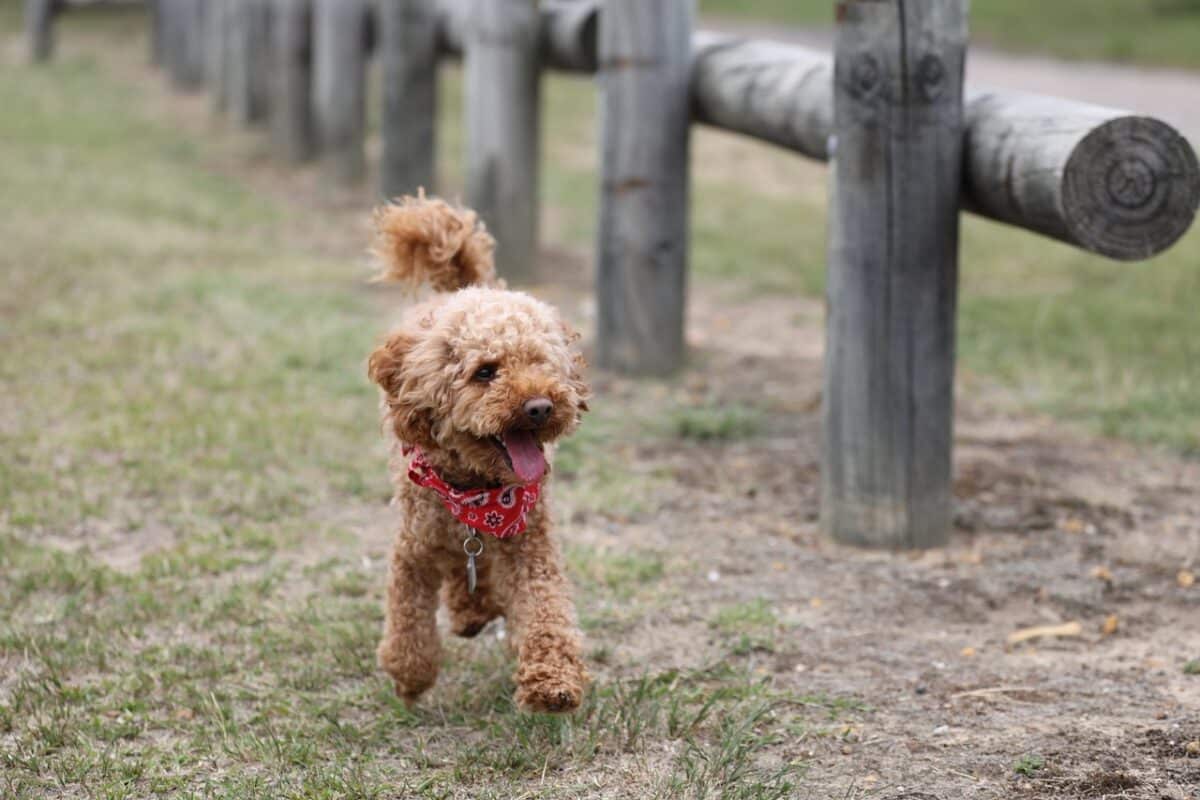
When it comes to feeding your little Toy Poodle, you want to make sure you’re giving them the best possible diet to keep them healthy and happy. After all, they may be small, but they pack a big punch of energy that needs sustenance.
First things first, you want to make sure you’re choosing a high-quality dog food that meets their specific nutritional needs. Toy Poodles have a small stature and high metabolism, so it’s essential to choose a nutrient-dense food that will provide them with the energy they need to run around and play all day.
A diet rich in proteins with low-fat content and moderate carbohydrates is perfect for Toy Poodles. On top of that, don’t forget to pay attention to the ingredients in your Toy Poodle’s food. Avoid foods that contain fillers like corn, wheat, and soy, as well as artificial preservatives, colors, and flavors.
Besides, paying attention to portion sizes is vital since Toy Poodles are prone to obesity if they eat more than they need. A pro tip is to feed them according to the manufacturer’s recommendations based on their weight and activity level.
If you’re ever unsure of your pup’s dietary needs, consult with a vet or professional nutritionist to determine the specific requirements for your Toy Poodle.
Exercises and Routine of Toy Poodles
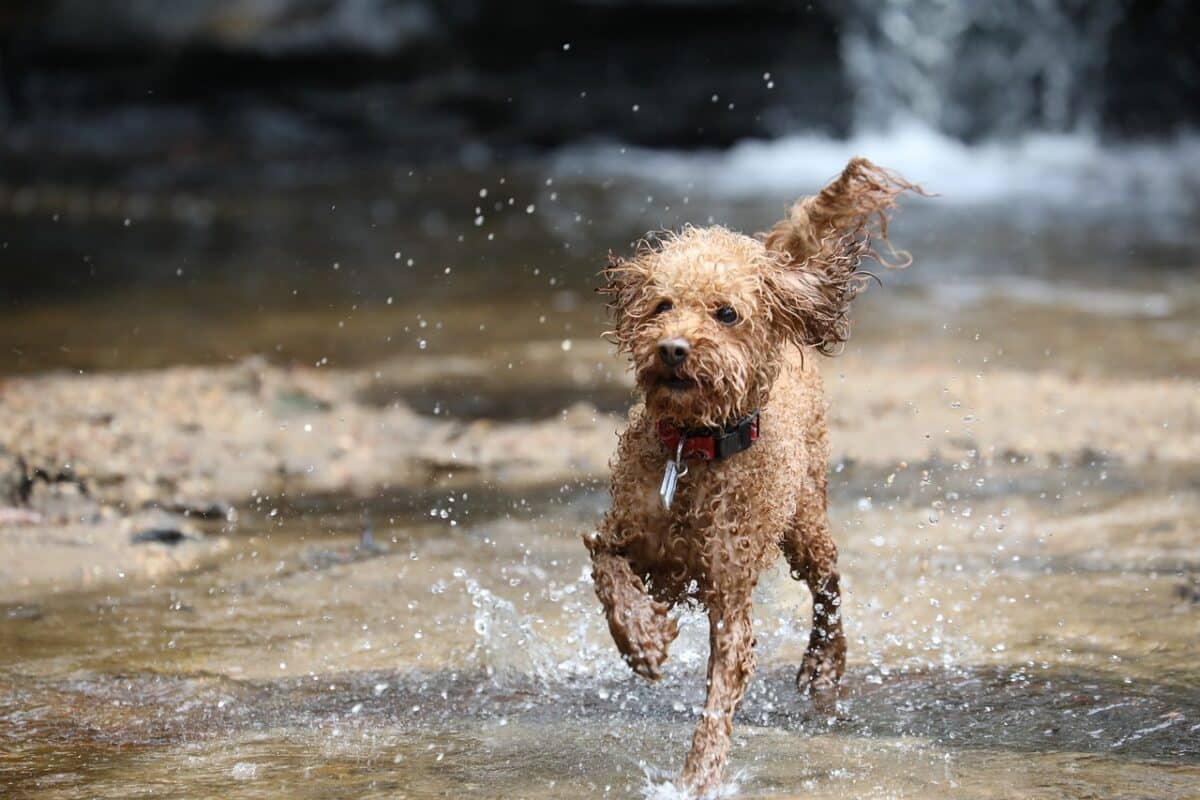
When it comes to training and exercising your Toy Poodle, you’re in for a real treat! These little pups are highly intelligent and respond well to positive reinforcement training methods, making them a breeze to train.
Besides, basic obedience training for them is a must. Teaching your Toy Poodle commands like sit, stay, come, heel, and down will help establish good communication and manners. The best part is that they’re quick learners, so with consistency and positive reinforcement techniques, like treats and praise, training will be a fun bonding experience for you and your pup.
Since they have a lot of energy, they also need lots of mental stimulation. Regular walks, playtime, and interactive toys can help keep them physically and mentally stimulated.
Moreover, if you’re looking for a fun bonding activity, they excel in agility training and enjoy activities like obedience, and trick training. They’re ideal candidates for competitive events like agility trials.
In terms of exercise, regular walks and playtime are a must to keep them mentally and physically stimulated. They are a playful and energetic breed that enjoys being active. At the very least, they should have 20-30 minutes of brisk walking, running, or playing per day.
Due to their small size, Toy Poodles do not require a large amount of space to exercise. They can be happy living in an apartment or small home as long as they receive regular walks and playtime. However, they also enjoy being outdoors and can benefit from a securely fenced yard or park to run around in.
Socialization is also an essential aspect of training. They crave human companionship, so it’s important to expose them to various people, animals, and environments from an early age. This will help them become well-adjusted and well-behaved pups that are confident in any situation.
Grooming of Toy Poodles
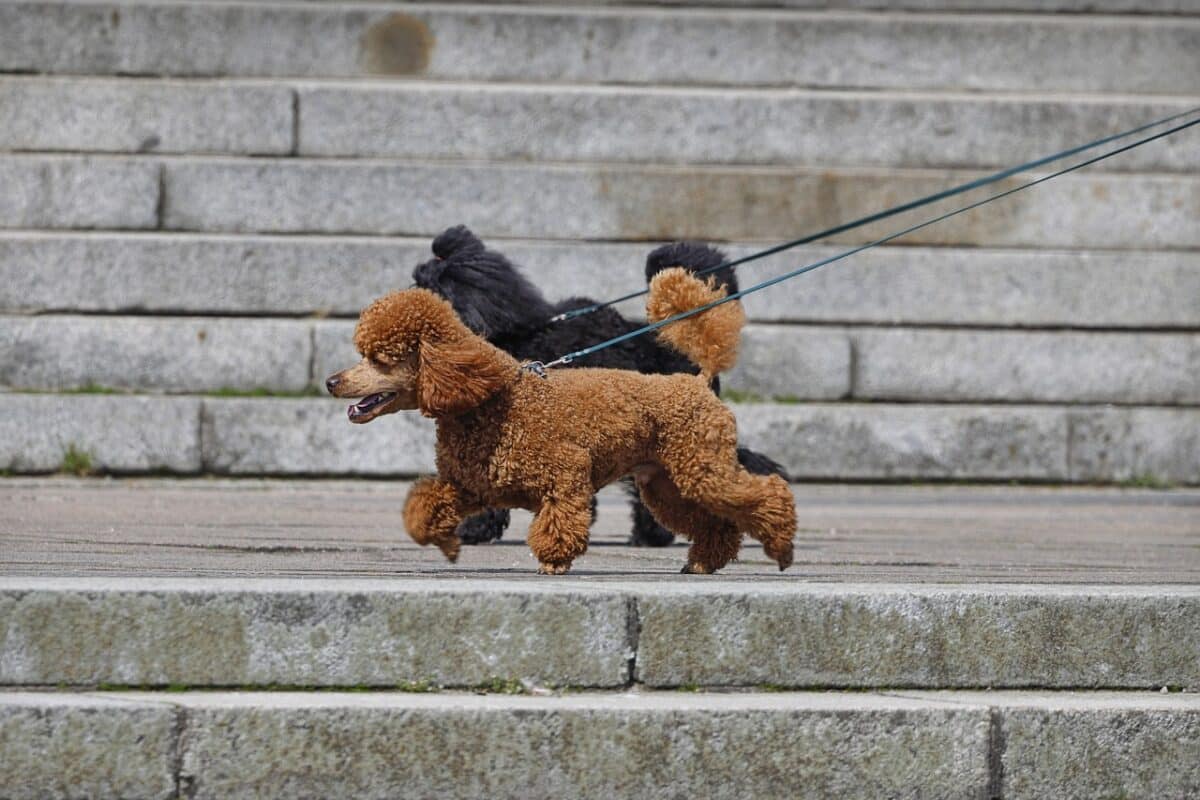
When it comes to caring for your Toy Poodle’s coat, you must prepare for a bit of extra work compared to other breeds. Other than having a lot of personality, they also have a lot of hair.
First things first, their thick, curly coat requires regular grooming to keep it in top condition. That means regular brushing and combing to prevent matting and tangling. According to recommendations, you should brush their coat at least twice a week, so you’ll want to invest in a good quality brush and comb. Besides, if you’re feeling adventurous, you can even give trimming a try to keep their coat at a manageable length.
However, if you want your pup to have that distinctive “poodle clip” grooming style, in which their fur is shaved to resemble a pom-pom, you might need to pay regular visits to a professional groomer to maintain the shape.
But it’s not just combing that’s necessary. Toy Poodles also need regular bathing to keep their coat clean and shiny. So, stock up on some high-quality dog shampoo and conditioner and get ready to give your pup a good scrub! In order to get them used to bathing, you should enforce this from an early age. Moreover, cleaning their ears on a regular basis is highly imperative to prevent infections.
On top of that, their nails need to be trimmed regularly to prevent them from causing discomfort. Similarly, don’t forget to brush their teeth regularly, too; this will prevent plaque and tartar buildup.
Pros and Cons of Owning Toy Poodles
Despite being adorable creatures that seem like perfect companions for you, Toy Poodles have their own set of pros and cons as pets that you must consider before adopting one.
Pros
- Small size: Toy Poodles are one of the smallest dog breeds, which makes them well-suited for people with limited space or who live in apartments.
- Intelligent and trainable: Toy Poodles are highly intelligent, excel in obedience and agility training, and are known to learn tricks easily.
- Affectionate and sociable: Toy Poodles are known for their affectionate nature and are outgoing and sociable, which makes them excellent companion dogs.
- Hypoallergenic: Toy Poodles have a hypoallergenic coat, which makes them a popular choice for people with dog allergies.
- Good with children: Toy Poodles are known to be good with children and other pets if raised with them.
- Adaptable: Toy Poodles are highly adaptable and can thrive in both city and country environments. They can be happy living in an apartment or small home as long as they receive regular walks and playtime.
- Long lifespan: Toy Poodles have a long lifespan of around 12-15 years.
- Low hair-shedding: Toy Poodles do not shed much, which makes them suitable for people with allergies or those who don’t want a lot of fur in their homes.
Cons
- High-maintenance grooming: The thick, curly coat of Toy Poodles requires regular grooming to maintain its shape and texture. This can be time-consuming and costly as they need frequent visits to a professional groomer and routine brushing, trimming, and clipping.
- Prone to health issues: Toy Poodles are prone to certain diseases, such as hip dysplasia and bloat, which can be costly to treat.
- Stubborn: Toy Poodles can be stubborn at times, which can make training more challenging. They require consistent and positive reinforcement training to prevent behavior issues from arising.
- Prone to obesity: Toy Poodles are predisposed to obesity, so it’s important to monitor their diet and exercise to maintain a healthy weight. This can be challenging as they have a high metabolism and can be prone to overeating.
- Vocal: Toy Poodles are known to be quite vocal, which can be a problem if they are not properly trained and socialized. They may bark excessively if not taught to be quiet on command.
- Extremely energetic: Toy Poodles are playful and energetic, so they require regular exercise and mental stimulation to keep them happy and healthy. This might prove challenging for people with busy schedules or limited mobility.
If you want to explore more about these pooches’ pros and cons, click here.
Diseases Associated With Toy Poodles
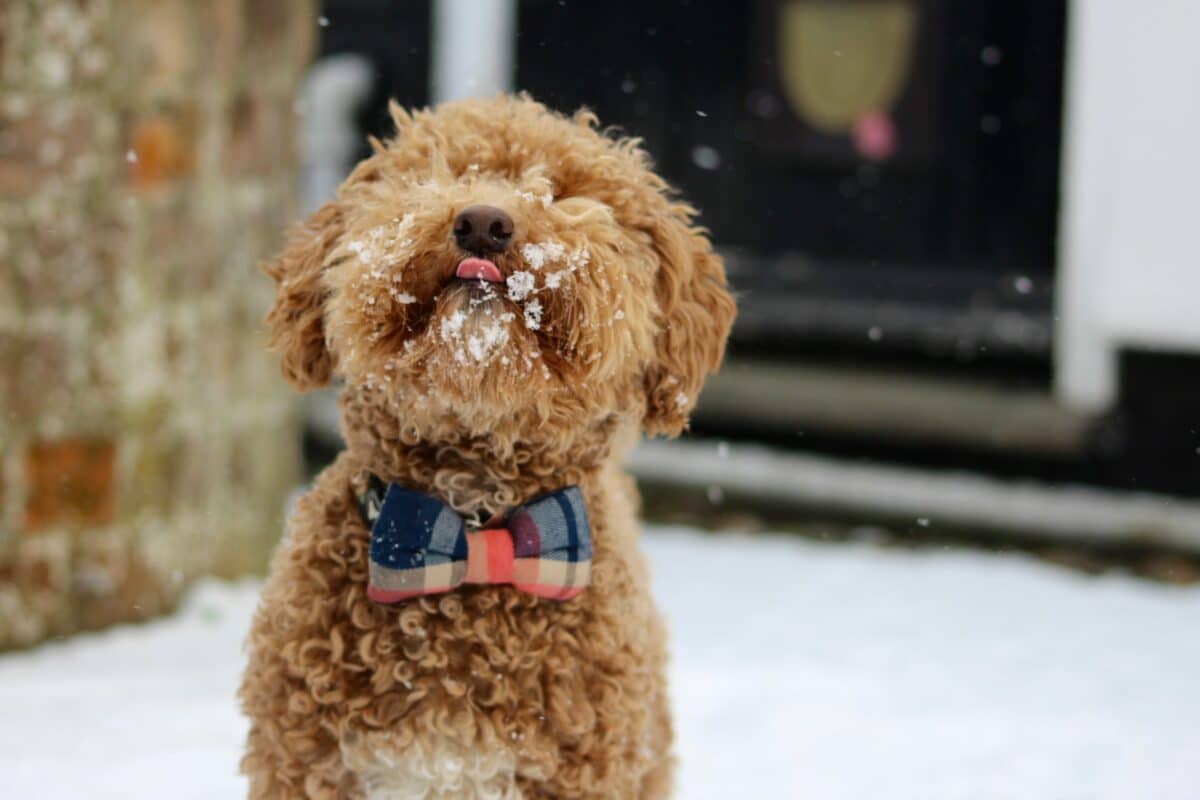
Toy Poodles, like all breeds, are prone to certain health issues. Some of the most well-known health issues in Toy Poodles include:
- Hip Dysplasia: A genetic condition that affects the hip joint and can cause arthritis and lameness.
- Patellar Luxation: A condition in which the knee joint dislocates. It can cause pain, lameness, and arthritis.
- Bloat: Also called gastric torsion or twisted stomach, this is a life-threatening condition in Toy Poodles that occurs when their stomach fills with gas and twists on itself. This can cause a lack of blood flow to the stomach and can be fatal if not treated quickly.
- Legg-Calve-Perthes Disease: This is a degenerative hip disorder that can cause lameness and arthritis.
- Epilepsy: This is a neurological disorder that causes seizures.
- Progressive Retinal Atrophy (PRA): This is an inherited eye disorder that cause blindness.
- Dental Issues: Toy Poodles are prone to dental problems such as tartar buildup, gingivitis, and tooth loss.
- Addison’s Disease: This is a disorder of the adrenal gland.
- Von Willebrand Disease: This is a bleeding disorder.
- Tracheal collapse: A condition where the windpipe of a Toy Poodle collapses.
- Hypoglycemia: This is a condition common in Toy Poodles due to low blood sugar and can cause seizures and even coma if left untreated.
- Cushing’s Disease: This occurs due to the overproduction of the hormone cortisol by the adrenal glands.
- Allergies: Due to inhalants, foods, or contact with surrounding materials.
Summary
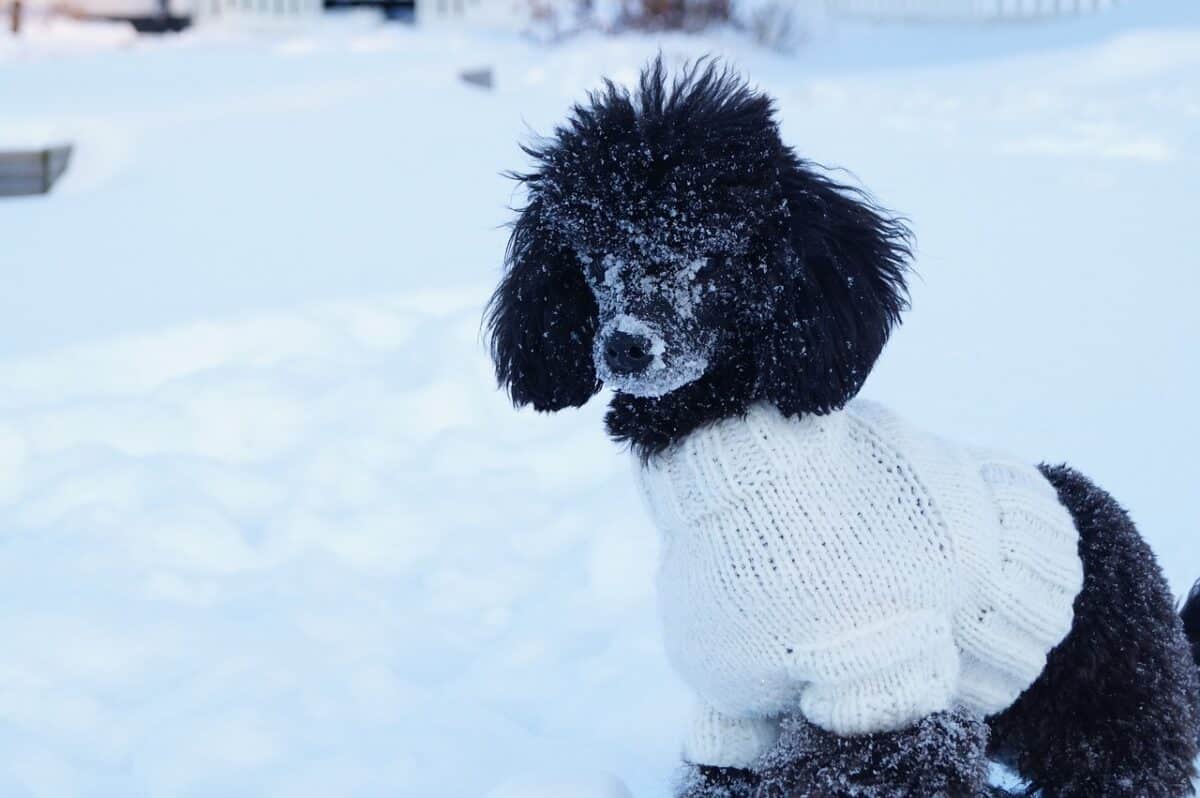
| KEY POINTS |
| The name “Toy Poodle” is derived from its size, which is considered a “toy” size. The word “poodle” originated from the German word “pudel,” meaning “to splash in the water.” |
| They have a thick and curly coat that comes in a variety of gorgeous colors, including white, black, apricot, silver, and even blue. |
| They are known for their joyful and affectionate personalities and are highly intelligent. |
| A diet rich in proteins with low-fat content and a moderate amount of carbohydrates is perfect for Toy Poodles. |
| Toy Poodles need regular bathing and brushing to keep their coat clean and shiny. |
| Toy Poodles are prone to certain health issues, such as hip dysplasia, bloat, and patellar luxation, which can be costly to treat. |
The Final Word
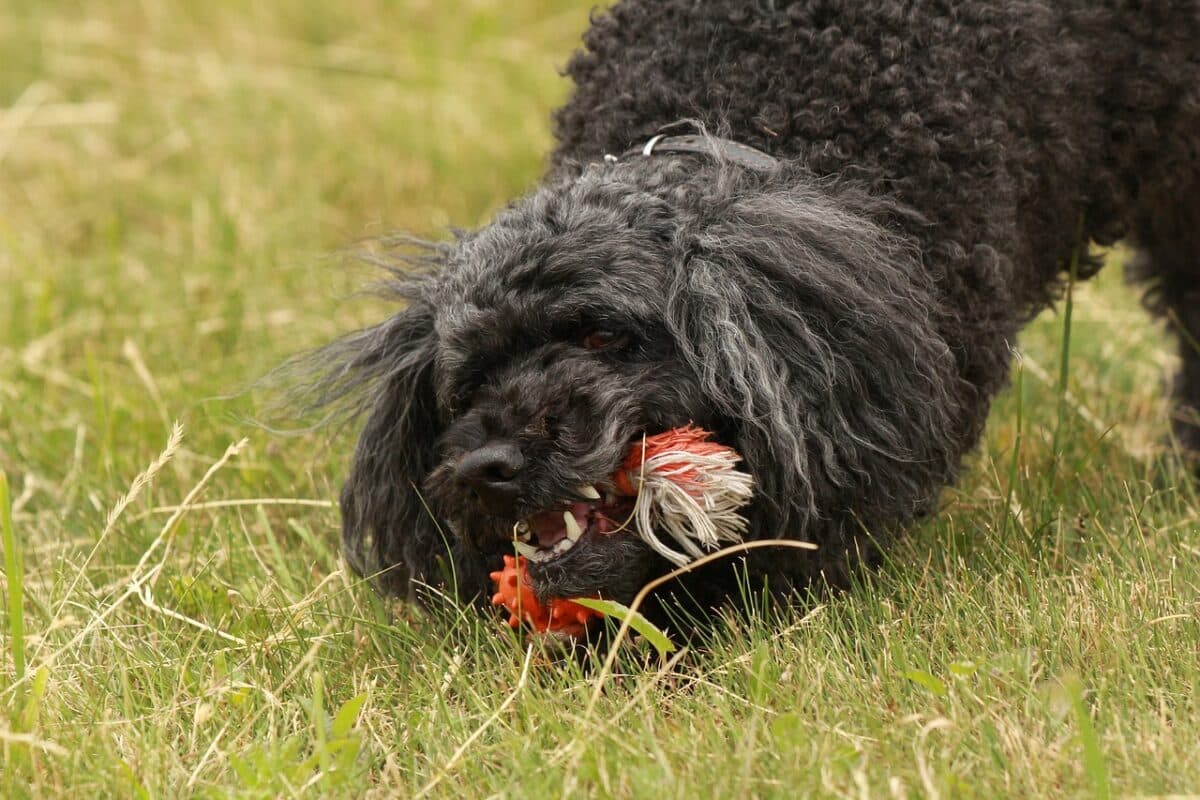
In a nutshell, if you’re thinking about getting a Toy Poodle, you better have a sense of humor and a love for fluff! These little pups are not just cute and cuddly – they’re also bundles of energy and personality.
They’ll keep you on your toes with their constant need for attention and grooming, but they’ll also keep you laughing with their silly antics and goofy expressions.
Just remember, if you get a Toy Poodle, you better be ready for a lifetime of bad hair days (for both you and your pup!) and impromptu grooming sessions in public.
In all seriousness, though, Toy Poodles can make great pets for the right family. But, before you choose to bring one home, make sure you consider your lifestyle, allergies, financial considerations, and living space to make an informed decision. Having read this, you already know most things about them and the factors you need to consider!
Thank you for reading this article! If this tickled your fancy you are undoubtedly a fellow doggo-lover. Our article on the Weimaraner will definitely interest you as well.
Join our Forum for free today!


